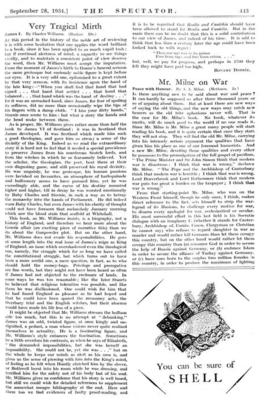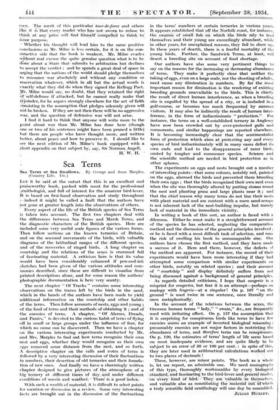Mr. Milne on War
Peace with Honour. By A. A. Milne. (Methuen. 5s.)
Is there anything new to be said about war and peace ? It can hardly be supposed so after three thousand years or so of arguing about them. But at least there are new ways of saying the old things, and the new ways may catch new hearers as the old trite aphorisms never will. That is the case for Mr. Milne's book. No book, whatever its merits, will do much good to the world if no one reads it. Since Mr. Milne is Mr. Milne a great many people will start reading his book, and it is quite certain that once they start they will not stop. They will find the old Mr. Milne, carrying into his intensely serious argument the qualities that have given him his place as one of our foremost humorists. And a new Mr. Milne, devoting those qualities and every other he possesses to the promulgation of the full gospel of pacifism. " The Prime Minister and Sir John Simon think that modern war is disastrous ; I think that war is wrong," declares Mr. Milne. " The Pope and the Archbishop of Canterbury think that modern war is horrible ; I think that war is wrong. Lord Beaverbrook and Lord Rothermere think that modem war puts too great a burden on the taxpayer ; I think that war is wrong."
From that starting-point Mr. Milne, who was on the Western Front himself, though he only once, I think, makes direct reference to the fact, sets himself to strip the war- legend of its illusions, to challenge every motive for war, to disarm every apologist for war, ecclesiastical or secular. His most successful effort in this last field is his Socratic dialogue with an imaginary C. (whether it stands for Canter- bury, Archbishop of, Curate, Canon, Clergyman or Christian he cannot say) who refuses to regard slaughter in war as murder and would rather kill Germans than let them occupy this country, but on the other hand would rather let them occupy this country than (a) renounce God in order to secure the help of Russia against Germany, or (b) embrace Islam in order to secure the alliance of Turkey against Germany, or (c) have sons born to the surplus two million females in this country, in order to produce the maximum of fighting men. The merit of this particulai tour-de-force and others like it is thatevery reader who -has -not -sworn to -:refuse to. think at any price wil find liiniself eciiiipeiled to -think to gome purpose.
Whether his thought will lead him to the same positive conclusions as Mr. Milne is less certain, for it is on the con- structive side that the book is weakest. Mr. Milne evades without real excuse the quite genuine question what is to be dOne about a State that submits to arbitration but declines to accept the verdict ; and he spends a great-deal of space in urging that the nations of the world should pledge themselves to renounce war absolutely and without any condition or reservation whatever, which in all but the actual words is exactly what they did do when they signed the Kellogg Pact. Milne would say, no doubt, that they retained the right of 'Self-defence if attacked, but he cannot really make that rejoinder, for he argues strongly elsewhere for the act of faith consisting in the assumption that pledges Soleninly given will not be broken. If they are not then there will be no aggressive war, and the question of defensive war will not arise.
I find it hard to think that anyone will write more to the point about war than Mr. Milne has done here (though one or two of his sentences might have been pruned a little) but there are people who have thought more, and written better, about peace and how to preserve it. I should like to see the next edition of Mr. Milne's book equipped with a Short appendix on that subject by, say, Sir Norman Angell.
H. W. H. '



















































 Previous page
Previous page